By Lynda Griparic
Anyone who knows me, knows I enjoy eating well. I get extreme pleasure from preparing and eating good food for others and myself, especially when I know it will nourish, make us feel good and provide the energy needed to make the most of this fabulous life.
Even though I was exposed to a wide variety of foods growing up in a very European household, there are simply some foods I would not touch with a barge pole. I have selected five to discuss, leaving out some others you may already know about such as vegetable oils, margarine and commercially prepared salad dressings.
1. Skim/Low Fat Milk
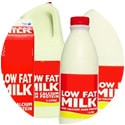
To start with, many skim milks are sweetened to help with palatability. Would you believe that low fat milk can have as much as 13g of sugar per cup?
Furthermore many essential vitamins found in whole milk such as Vitamin D, E and A are fat soluble and need fat to be transported and distributed throughout the body. Low fat milks therefore lack the vehicle our bodies and minds need to absorb and make use of these nutrients.
The healthy “good” fats such as those found in whole milk, are essential for the production of a hormone called Cholecystokinin (CCK). CCK is the fella responsible for the feeling of fullness. It makes sense then that low fat or skim milk can often leave you feeling unsatisfied, and inclined to reach for more food shortly after eating to fill the void. Good fats also slow the release of sugar into your bloodstream, reducing the amount that can be stored as fat.
| Tip #1 If you drink milk, have unhomogenised full fat milk instead of skimmed. |
2. Muesli Bars & Commercially Prepared Muesli
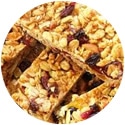
It may shock you to know that most muesli bars and muesli’s readily available in supermarkets and health-food stores contain an alarmingly high amount of sugar, processed carbohydrates and often harmful vegetable oils! These can have detrimental affects on your overall health and weight loss goals.
If the idea of giving up on muesli is far too much to bear, consider making your own simple, yet delicious, sugar and grain free muesli that will not cause a huge blood sugar spike.
An example could be combining seeds (sunflower, pepitas, chia, sesame) with roughly chopped nuts (walnuts, pecans, macadamias, , hazelnuts, almonds) and shredded unsweetened coconut. You could mix these with coconut oil, cinnamon powder and vanilla and bake in the oven until lightly toasted. Serve it up with coconut milk, full cream cow or goat milk or homemade almond milk.
Also the 180 protein bars are a great natural alternative to your muesli bars if you are looking for a convenient snack.
| Tip #2 If you are going to eat muesli, make your own. |
3. Sports Drinks
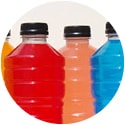
Unfortunately most sports drinks are far from healthy, in fact most have no real health benefit at all and can negatively effect your health. They are high in sugar and contain many chemicals such as preservatives, dyes and a well known brand contains brominated vegetable oil, a flavour and colour enhancer. Vegetable Oils….need I say more?
If its vitamins, minerals and energy that you are after you are better off consuming real, whole foods, beverages and supplements such as healthy fats, quality, clean protein, antioxidant rich fruit (berries), fibrous vegetables, nuts, seeds, water, herbal teas and yes even a cup of good quality coffee without the sugar and skim milk thanks.
| Tip #3 Try making your own sports drink for recovery; a pinch of himalayan rock salt & a squeezed lemon with water. |
4. Fruit Juices
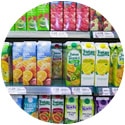
To put it in perspective, fruit juice can contain more sugar than a can of coca cola. Up to 12 tsp per glass. Its an ugly thought isn’t it and not a habit we want to get into if optimal health and weight control is your goal.
I would even err on the side of caution with those beverages labelled 100% fruit juice. Whilst they may contain “only” fruit they are without the fibre found when we eat the real thing. In essence you are getting a big dose of fruit sugar (fructose), which messes with your blood sugar levels and leaves you feeling ungrounded, hungry and anxious. Not to mention fruit juice does nothing for your waist line because as we know excessive sugar is converted into fat, compounded also by the fact that fruit juice will leave you feeling hungry and thus more inclined to unnecessarily reach for more food.
Sadly most manufacturers add additional sugar to these already naturally sweet beverages. The danger here aside from the blood sugar spike is that we develop a taste for sweet foods and our cravings and consumption grows. At the end of the day when all we want for ourselves is great health and happiness we need to be aware of the excessive often “hidden” sugars found in our food and beverages.
You are better off eating a piece of fresh fruit as one glass of fruit juice contains much more sugar than the whole fruit and you are loosing much of the fibre which helps to keep the digestive and elimination systems working well. The fibre found in a piece of fruit such as an apple slows down the absorption and protects us from the effects of fruit sugar. Strip away the fibre and cram multiple fruits into a bottle and what you get is a sugary drink which absorbs quickly and leaves you feeling hungry. Do you really need more convincing?
| Tip #4 Eat a piece of fruit instead, or make your own 80% veggie juice with 20% fruit. |
5. Weight Loss Shakes & Poor Quality Protein Powders
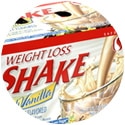
There are many commercial protein powders and weight loss shakes on the market containing concerning amounts of heavy metal toxins such as cadmium, lead, mercury and arsenic. In addition to this most are artificially sweetened and treated with heat and acid which again affects the quality and renders them useless to your health.
Needless to say that I avoid most commercially prepared powders like the plague. For myself and for patients. Having said that good quality, highly nutritious protein based powders exist you just need to do some simple research (I recommend 180 Natural Protein to my clients).
I would start with establishing where the source of whey is from and how it’s processed.You might also want to consider how many ingredients it contains. Do you recognise any of these? Is it artificially sweetened? Does it contain fibre? An important question if you are using it to replace a meal. We want to make sure the bowels are happy and kept regular.
In a nutshell, I lean toward protein based powders that contain grass fed whey, that is low allergy (e.g without gluten) and one that has had minimal processing. Of course there are many who can not tolerate dairy at all. In this instance I would use non whey based protein powders such as pea protein, using the same questions above for your detective work.
In essence, protein powders can be worthy of shelf space in your cupboards provided you choose good quality, minimally processed varieties like 180nutrition protein powder. Simply avoid the commercially prepared varieties that will do nothing to positively impact your health.
| Tip #5 Choose high quality protein powders with ingredients you recognise with minimal processing. |
Conclusion
As you can see all of my top five fall into the processed, distant relative to whole food category. Put simply, if you suspect a “health-food” might not be that healthy, keep it simple and opt for food close to its natural form and a minimal ingredient list with items you recognise.
Thats what the body thrives on and deserves so please don’t throw complex stuff into it that it may not know what to do with.
What would your top 5 be? Do you agree? Love to hear your thoughts in the comments below.

Lynda specialises in detoxification and weight loss. She has extensive experience in running healthy, effective and sustainable weight loss programs and has expertise in investigating and treating the underlying causes of weight gain and metabolic problems.
If you would like to book a consultation with Lynda, CLICK HERE



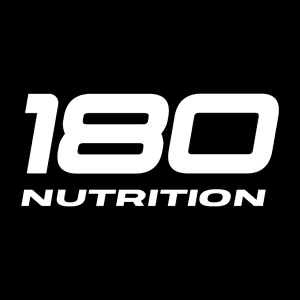
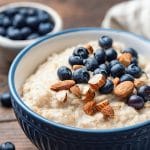

2 Replies to “5 Shocking ‘Health’ Foods I Would Never Touch”
Hey guys,
Good common sense stuff as always, I recently purchased a Nutribullet, which you use with green smoothies etc. Basically I needed to get a blender that was easy to use and clean and good at what it does. The Nutribullet has’nt dissapointed, it is a quality bit of kit. The basic premise is to place one to two cups of greens or veggies in first, then any fruit of your choice followed by your choice of either nuts, or superfood ingrediants such as goji berries, acai powders or whatever if you wish, add water and blend. The end result is a 500ml to 750ml nutriblast, but with all the discussion on fruit based drinks lately, I’m wondering where this fits in health wise? I would really like to make my nutriblasts into a meal replacement, which was the primary motivation from the start.
Your thoughts,
regards
John
Hey John… There’s actually many aspects to that question 😉 But in short, fruit is carbs, and the amount of carbs we need varies for each individual like body type and daily activity levels. I generally have low GI fruit like berries and avocado in my meal replacement 180 smoothie (eg: http://bit.ly/1z8BcXV) . Here are a couple of short videos that may help clear up some confusion too 😉 Hope that helps, Guy
https://180nutrition.com.au/2013/09/02/2-minute-gems-should-we-be-eating-fruit/
https://180nutrition.com.au/2014/12/03/discover-why-we-get-fat-understanding-your-carbohydrate-tolerance/
Comments are closed.